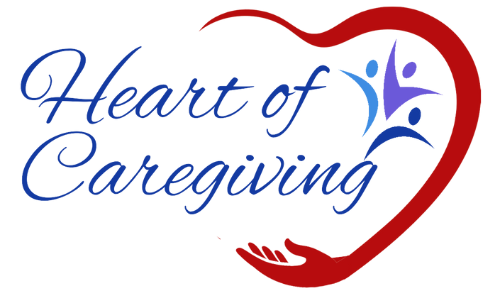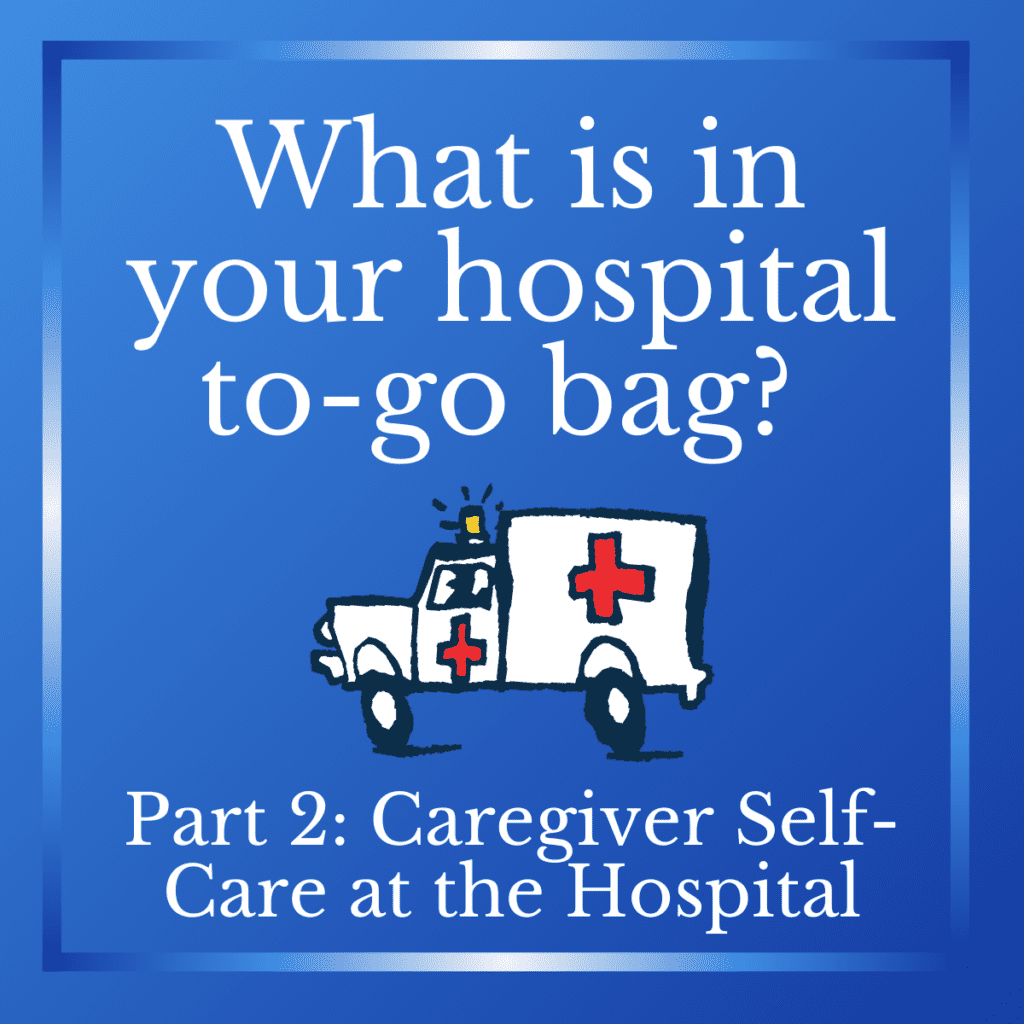Self-Care for Caregivers During Hospital Stays
In a recent post, What’s In Your In-Case-Of-Emergency (ICE) Bag? Part 1, we discussed the value of having an In-Case-of-Emergency, ICE, to-go bag. Critical items to include are health information and history.
This is Part 2! Your ICE to-go bag can also include essential caregiver supplies, or you may want to build a separate emergency room caregiver bag. It’s not uncommon to be in the ER for four to ten hours. Why not have at least the minimum comfort items? Self-care for caregivers during hospital stays is crucial. Consider this list and add your own “must-have” items.
Essential Caregiver Supplies:
1. Your cell phone and charger (minimum 20 ft) or battery.
2. Water bottles or drinks.
3. Jacket (emergency rooms are generally cold!).
4. Snacks might include granola or nut bars, fruit, gum, or mints.
5. Wipes or napkins.
6. Notebook and pen (for notes, journal, or other uses).
7. Current reading material.
8. Copy of loved one’s health insurance info, ID, or Driver’s License, and people to notify.
9. Your emergency, family, and friend contacts.
10. Change of clothes.
11. Hairbrush, toothbrush, and toothpaste.
12. 48-hour supply of your medications.
13. Other items to consider are essential oils, devotional reading material, change for the vending machines, and a disabled person parking placard.
14. Add your items to the list—you might be there for hours and hours.
While on the topic, hospitalization often follows a crisis. As caregivers, we can be in turmoil and focused on the immediate needs of our family member. Days can pass before we realize we have not been eating well or slept a whole night since the incident. We likely face increased responsibilities and even more stress as our family member returns home and relies on us more than before the hospital stay. This is why self-care for caregivers during hospital stays is so important. We need to be at our best to manage current and future challenges and can start taking steps during the hospital stay to support our well-being.
You are the best advocate, but…
You are undoubtedly the best advocate for your family member. As you regularly communicate with the medical team, ask questions about the diagnosis, treatment plan, and prognosis. Keep a journal of medical updates, medication schedules, and changes in the care recipient’s condition. This can help you track progress and communicate with different healthcare providers. As your family member’s advocate, ensure their wishes and needs are communicated to the medical staff. This includes discussing advanced directives and preferences for care. You can identify the primary point of contact among the hospital staff and establish a rapport. This can streamline communication and ensure consistent information.
Understandably, you want to be with and advocate for your family member, but it is unrealistic and unhealthy for you to be there every minute. Consider who can give you a break and be with your family member in the hospital. Take that time to catch up on sleep, take a walk, and breathe deeply. Resupply your snacks and stock your refrigerator. Include lots of protein to give you the energy you need. Create a plan to minimize stress. Your plan may include journaling, prayer, meditation, exercise, and talking with friends or family.
Who could be the one person to whom you provide updates? They can share the information with concerned family and friends so that you do not have to manage the many phone calls and emails. This point of contact could also coordinate other support for you and your family member.
Consider the future
While spending time in the hospital with your family member, you might take some time to think about the future and what changes will be needed. Future needs may be uncertain, and it may not be clear what additional support will be required. You might make plans A, B, and C and begin to fill in the details. Start with planning for a temporary rehab stay. What does that look like from your perspective and ability to provide support? Where would it be? The hospital social worker or case manager will likely provide a list of possible locations. Ask to speak with them now. What other resources might you need when your family member returns to their home? Can the case manager help you with locating resources? Will you need to learn any new procedures? You could record or video the steps, so you do not need to rely on memory.
This would be a good time to contact your local area agency on aging and determine how they can help you and your family member. If you have already been using their services, you could update the case manager with news of the hospitalization and discuss what additional supports and resources might be helpful. You could also begin researching the progression of the ailment or concern that led to the hospital stay. For example, if a fall resulted in the hospitalization, what can you learn about fall prevention? What changes can be made at home? What advocacy organizations exist?
Practice self-compassion
Hospital stays can be unpredictable. Mistakes and misunderstandings happen. Be prepared to adapt to changes in the care plan and hospital routines. Most importantly, remember that feeling overwhelmed, anxious, or frustrated is normal. Acknowledge your feelings without judgment and practice self-compassion. Every caregiving journey is unique, and you’re doing your best in a challenging situation.
For more on preparing for and managing a hospitalization and other solutions for caregivers’ common mistakes, check out 21 Mistakes Caregivers Make & How to Avoid Them: Solutions and Strategies to Reduce Stress and Increase Happiness, available on Amazon! Are you looking for a dynamic speaker on caregiver empowerment? Go to my speaking page, and let’s connect!
The advice offered is for general information only; please consult your healthcare team, legal, or financial advisors for guidance.


